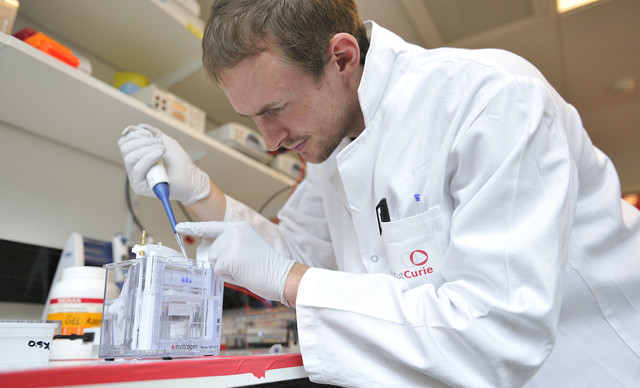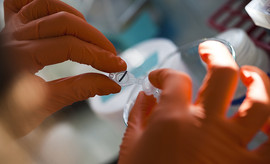Cancer Biology, Genetics & Epigenetics

Focusing on questions that are pertinent to the processes of cell division, morphogenesis, stem cell function and germ line development, Institut Curie teams aim to understand mechanisms of genome stability, gene expression and epigenetic changes, that are also relevant to cancer.
To explore these questions at different scales, our teams use a wide range of technologies, including stem cell biology, advanced biochemistry, super-resolution microscopy, genetic engineering and bioinformatics, in close communication with Institut Curie's technology platforms.
In the field of biomedical research, our research teams are particularly involved in the development of biomarkers for cancer, for diagnostic and therapeutic purposes.
Institut Curie's Developmental Biology, Cancer, Genetics and Epigenetics field regroups 19 teams around a common theme : the investigation of the genetic and epigenetic basis of normal physiological processes such as development and abnormal situations such as cancer.
GENETICS AND DEVELOPMENTAL BIOLOGY
The research unit adresses fundamental questions related to the development of organisms and its pathological dysfunctions, and more specifically the following themes:
- The acquisition and maintenance of identity of stem cells, germ cells, or specialized somatic cells through cell signaling and transcriptional control
- The control of gene expression by the non-coding genome (ncRNAs, transposons) in normal and pathological conditions
- The role of mechanical forces and cell divisions in building embryos and tissues
- The role of inter-organ communications and systemic signals in tissue growth and homeostasis.
DYNAMICS OF GENETICS INFORMATION
This research unit aims at elucidating the regulation of mechanisms that are crucial to the maintenance of genome integrity, like DNA replication, repair and recombination, as well as the role of cell cycle checkpoints and non-coding RNAs in genome and epigenome maintenance.
Experimental models include yeast, mammalian cell lines, mutant mouse models and tumour samples. A large variety of methods is used including genetic, molecular and cytogenetic techniques, fluorescence in situ hybridisation and DNA ‘combing’, as well as high throughput sequencing approaches such as DNA-seq for mutation landscape analyses, RNA-seq for transcriptome analyses and ChIP-seq mapping of chromatin-associated proteins and their genome-wide modulation in response to DNA damages.
NUCLEAR DYNAMICS
This research unit investigates the mechanisms underlying the stability and the plasticity of genetic and epigenetic information in normal or pathological contexts such as cancer. Using complementarity approaches, we develop an integrated view of the functional organization of the genome at different scales: from the molecule to the cell to the organism. The main research themes of the unit include:
- The roles of factors involved in chromatin dynamics, genome stability and repair.
- How functional domains of eukaryotic genomes are established and then maintained during development.
- How epigenetic plasticity plays a part in controlling the polarity of the embryo.
- How nuclear compartmentalisation and dynamics participate in regulating various functions of the genome.


